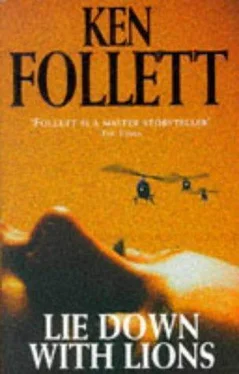Ken Follett - Lie down with lions
Здесь есть возможность читать онлайн «Ken Follett - Lie down with lions» весь текст электронной книги совершенно бесплатно (целиком полную версию без сокращений). В некоторых случаях можно слушать аудио, скачать через торрент в формате fb2 и присутствует краткое содержание. Жанр: Боевик, на английском языке. Описание произведения, (предисловие) а так же отзывы посетителей доступны на портале библиотеки ЛибКат.
- Название:Lie down with lions
- Автор:
- Жанр:
- Год:неизвестен
- ISBN:нет данных
- Рейтинг книги:4 / 5. Голосов: 1
-
Избранное:Добавить в избранное
- Отзывы:
-
Ваша оценка:
- 80
- 1
- 2
- 3
- 4
- 5
Lie down with lions: краткое содержание, описание и аннотация
Предлагаем к чтению аннотацию, описание, краткое содержание или предисловие (зависит от того, что написал сам автор книги «Lie down with lions»). Если вы не нашли необходимую информацию о книге — напишите в комментариях, мы постараемся отыскать её.
Lie down with lions — читать онлайн бесплатно полную книгу (весь текст) целиком
Ниже представлен текст книги, разбитый по страницам. Система сохранения места последней прочитанной страницы, позволяет с удобством читать онлайн бесплатно книгу «Lie down with lions», без необходимости каждый раз заново искать на чём Вы остановились. Поставьте закладку, и сможете в любой момент перейти на страницу, на которой закончили чтение.
Интервал:
Закладка:
Masud nodded, thought for a few seconds and said: ''The Russians have twelve thousand troops in the town of Rokha, the gateway to the Valley. Their dispositions are as always: first minefields, then Afghan troops, then Russian troops to stop the Afghans running away. They are expecting another twelve hundred men as reinforcements. They plan to launch a major offensive up the Valley within two weeks. Their aim is to destroy our forces."
Ellis wondered how Masud got such precise intelligence, but he was not so tactless as to ask. Instead he said: "And will the offensive succeed?"
"No," said Masud with quiet confidence. "When they attack, we melt into the hills, so there is no one here for them to fight. When they stop, we harass them from the high ground and cut their lines of communication. Gradually we wear them down. They find themselves spending vast resources to hold territory which gives them no military advantage. Finally they retreat. It is always so."
It was a textbook account of guerrilla war, Ellis reflected. There was no question that Masud could teach the other tribal leaders a lot. "How long do you think the Russians can go on making such futile attacks?"
Masud shrugged. "It is in God's hands."
"Will you ever be able to drive them out of your country?"
"The Vietnamese drove the Americans out," Masud said with a smile.
"I know—I was there," said Ellis. "Do you know how they did it?"
"One important factor, in my opinion, is that the Vietnamese were receiving from the Russians supplies of the most modern weapons, especially portable surface-to-air missiles. This is the only way guerrilla forces can fight back against aircraft and helicopters."
"I agree," said Ellis. "More important, the United States government agrees. We would like to help you get hold of better weapons. But we would need to see you make real progress against your enemy with those weapons. The American people like to see what they're getting for their money. How soon do you think the Afghan resistance will be able to launch unified, countrywide assaults on the Russians, the way the Vietnamese did toward the end of the war?"
Masud shook his head dubiously. "The unification of the Resistance is at a very early stage."
"What are the main obstacles?" Ellis held his breath, praying that Masud would give the expected answer.
"Mistrust between different fighting groups is the main obstacle."
Ellis breathed a clandestine sigh of relief.
Masud went on: "We are different tribes, different nations, and we have different commanders. Other guerrilla groups ambush my convoys and steal my supplies."
"Mistrust," Ellis repeated. "What else?"
"Communications. We need a regular network of messengers. Eventually we must have radio contact, but that is far in the future."
"Mistrust, and inadequate communications." This was what Ellis had hoped to hear. "Let's talk about something else." He felt terribly tired: he had lost quite a lot of blood. He fought off a powerful desire to close his eyes. "You here in the Valley have developed the art of guer-
rilla warfare more successfully than they have anywhere else in Afghanistan. Other leaders still waste their resources defending lowland territory and attacking strong positions. We would like you to train men from other parts of the country in modern guerrilla tactics. Would you consider that?"
"Yes—and I think I see where you're heading," said Masud. "After a year or so there would be in each zone of the Resistance a small cadre of men who had been trained in the Five Lions Valley. They could form a communications net. They would understand one another, they would trust me. ..." His voice tailed off, but Ellis could see from his face that he was still unwinding the implications in his head.
"All right," said Ellis. He had run out of energy, but he was almost done. "Here's the deal. If you can get the agreement of other commanders and set up that training program, the U.S. will supply you with RPG-7 rocket launchers, ground-to-air missiles and radio equipment. But there are two other commanders in particular who must be part of the agreement. They are Jahan Kamil, in the Pich Valley, and Amal Azizi, the commander of Faizabad."
Masud grinned ruefully. "You picked the toughest."
"I know," said Ellis. "Can you do it?"
"Let me think about it," said Masud.
"All right." Exhausted, Ellis lay back on the cold ground and shut his eyes. A moment later he was asleep.
CHAPTER 10
JEAN-PIERRE walked aimlessly through the moonlit fields in the depths of a black depression. A week ago he had been fulfilled and happy, master of the situation, doing useful work while he waited for his big chance. Now it was all over, and he felt worthless, a failure, a might-have-been.
There was no way out. He ran over the possibilities again and again, but he always ended up with the same conclusion: he had to leave Afghanistan.
His usefulness as a spy was over. He had no means of contacting Anatoly; and, even if Jane had not smashed the radio, he was unable to leave the village to meet Anatoly, for Jane would immediately know what he was doing and would tell Ellis. He might have been able to silence Jane somehow (Don't think about it, don't even think about it) but if anything happened to her Ellis would want to know why. It all came down to Ellis. I'd like to kill Ellis, he thought, if I had the nerve. But how? I have no gun. What would I do, cut his throat with a scalpel? He's much stronger than I am—I could never overcome him.
He thought about how it had gone wrong. He and Anatoly had become careless. They should have met in a place from which they had a good view of the approaches all around, so that they could have been forewarned of any approach. But who would have thought that Jane might follow him? He was the victim of the most appallingly bad luck: that the wounded boy was allergic to penicillin; that Jane had heard Anatoly speak; that she was able to recognize a Russian accent; and that Ellis had turned up to give her courage. It was bad luck. But the history books do not remember the men who almost achieved greatness. I did my best, Papa, he thought; and he could almost hear his father's reply: I'm not interested in whether you did your best, I want to know whether you succeeded or failed.
He was approaching the village. He decided to turn in. He was sleeping badly, but there was nothing else to do but go to bed. He headed for home.
Somehow the fact that he still had Jane was not much consolation. Her discovery of his secret seemed to have made them less intimate, not more. A new distance had grown up between them, even though they were planning their return home and even talking about their new life back in Europe.
At least they still hugged one another in bed at night. That was something.
He went into the shopkeeper's house. He had expected Jane to be in bed already, but to his surprise she was still up. She spoke as soon as he walked in. "A runner came for you from Masud. You have to go to Astana. Ellis is wounded."
Ellis wounded. Jean-Pierre's heart beat faster. "How?"
"Nothing serious. I gather he's got a bullet in his bum."
"I'll go first thing in the morning."
Jane nodded. "The runner will go with you. You can be back by nightfall."
"I see." Jane was making sure he had no opportunity of meeting with Anatoly. Her caution was unnecessary: Jean-Pierre had no way of arranging such a meeting. Besides, Jane was guarding against a minor peril and overlooking a major one. Ellis was wounded. That made him vulnerable. Which changed everything.
Now Jean-Pierre could kill him.
Jean-Pierre was awake all night, thinking about it. He imagined Ellis, lying on a mattress under a fig tree, gritting his teeth against the pain of a smashed bone, or perhaps pale and weak from loss of blood. He saw himself preparing an injection. "This is an antibiotic to prevent infection of the wound," he would say, then he would inject him with an overdose of digitalis, which would give him a heart attack.
Читать дальшеИнтервал:
Закладка:
Похожие книги на «Lie down with lions»
Представляем Вашему вниманию похожие книги на «Lie down with lions» списком для выбора. Мы отобрали схожую по названию и смыслу литературу в надежде предоставить читателям больше вариантов отыскать новые, интересные, ещё непрочитанные произведения.
Обсуждение, отзывы о книге «Lie down with lions» и просто собственные мнения читателей. Оставьте ваши комментарии, напишите, что Вы думаете о произведении, его смысле или главных героях. Укажите что конкретно понравилось, а что нет, и почему Вы так считаете.












